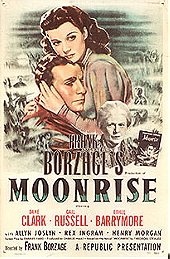The cycle of violence becomes an ever-widening gyre in Frank Borzage’s Moonrise. Less a violent story than a story about violence, and there is a difference between the two, where each successive action strengths that cycle of violence and chaos. The aftereffects of a parent’s death by capital punishment lead to that child’s stunted adulthood and barely concealed urges for retribution and score settling.
Borzage builds his reality on clearly artificial sets that underscore the suffocating ties that bind this society together. Swamps and ponds aren’t merely these things but haunted places to bury secrets or to seek refuge from the world. This is after all a cinematic world that’s recognizably like our own but filled with secretive places that become near holy in their emotional power within the narrative context. An abandoned mansion becomes a love chamber, a Ferris wheel takes on the same tenor of a confessional, and a shed in the swamp becomes a place where the cycle of violence dissipates into empathy and forgiveness.
Moonrise takes the pieces of noir and does something humanistic and warmly tender with them instead of the gritty black hats versus white hats with a gray hat in the middle of it all. Here is the story of a man who lost his father to capital punishment, only to have the sins of the father (and his death) used against him by childhood bullies and polite society to ostracize him further. When he finally snaps and murders his tormentor in an act that’s complicated, it’s not quite self-defense but it’s also not premeditated or a passionate flareup, the rest of the narrative finds him committing more acts of paranoia and violence to try and cover the first one up. Cause and effect are on naked display, and Borzage’s anti-hero is seeking spiritual forgiveness and a way to move beyond his traumas.
Borzage’s heavy use of symbolism and heightened romanticism is nearly exotic as it has gone so far out of vogue with the pervading ‘realism’ or blunt-force delivery of modern cinema. The line between a trapped racoon and the anti-hero of the film blur together until you’d be forgiven for mistaking one’s fateful capture for the other. But that’s not the only place where Moonrise visually tells or reveals its sentimentality instead of spouting it, like the near baptism of a rain scene or the ways in which that rain and memory become the same storm.
Occupying some neverwhere between Borzage’s typical romanticism and film noir’s inky shadows, Moonrise is a fascinating oddity. I suppose the closest other near parable/fairy tale-like noir-esque film like it would be The Night of the Hunter, another film that spliced genres together and provides a near dream-like, highly atmospheric world in which its story unfurls. Rarely has watching a man’s moral compass lose of true north been so lyrical, haunting, beautiful, and empathetic at it is under Borzage’s sympathetic lens.
 Login
Login